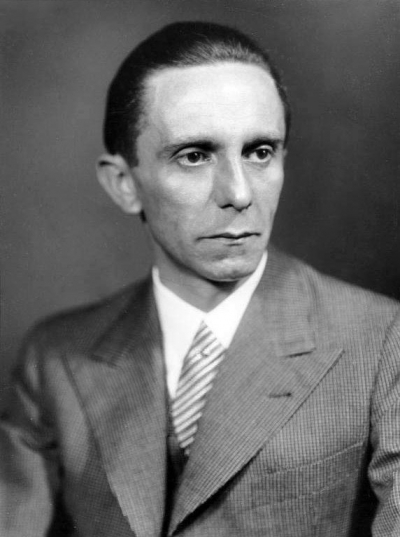The Sportpalast speech (German: Sportpalastrede) or Total War speech was a speech delivered by German Propaganda Minister Joseph Goebbels at the Berlin Sportpalast to a large, carefully selected audience on 18 February 1943, as the tide of World War II was turning against Nazi Germany and its Axis allies. The speech is particularly notable as Goebbels almost mentions the Holocaust, when he begins saying "Ausrotten" (using the German word for extermination), but quickly changes it to Ausschaltung (i.e. exclusion). This was the same word Heinrich Himmler used on 18 December 1941, when he recorded the outcome of his discussion with Adolf Hitler on the Final Solution, wherein he wrote "als Partisanen auszurotten" ("exterminate them as partisans").
It is considered the most famous of Joseph Goebbels's speeches. The speech was the first public admission by the Nazi leadership that Germany faced serious dangers. Goebbels called for a total war (German: totaler Krieg) to secure victory over the Allies, and exhorted the German people to continue the war even though it would be long and difficult becauseas he assertedboth Germany's survival and the survival of a non-Bolshevist Europe were at stake.
Paul Joseph Goebbels (pronounced [ˈpaʊ̯l ˈjoːzɛf ˈɡœbl̩s] (listen); 29 October 1897 – 1 May 1945) was a German Nazi politician who was the Gauleiter (district leader) of Berlin, chief propagandist for the Nazi Party, and then Reich Minister of Propaganda from 1933 to 1945. He was one of Adolf Hitler's closest and most devoted acolytes, known for his skills in public speaking and his deeply virulent antisemitism, which was evident in his publicly voiced views. He advocated progressively harsher discrimination, including the extermination of the Jews in the Holocaust.
Goebbels, who aspired to be an author, obtained a Doctor of Philology degree from the University of Heidelberg in 1921. He joined the Nazi Party in 1924, and worked with Gregor Strasser in its northern branch. He was appointed Gauleiter of Berlin in 1926, where he began to take an interest in the use of propaganda to promote the party and its programme. After the Nazis came to power in 1933, Goebbels's Propaganda Ministry quickly gained and exerted control over the news media, arts, and information in Germany. He was particularly adept at using the relatively new media of radio and film for propaganda purposes. Topics for party propaganda included antisemitism, attacks on the Christian churches, and (after the start of the Second World War) attempting to shape morale.
In 1943, Goebbels began to pressure Hitler to introduce measures that would produce "total war", including closing businesses not essential to the war effort, conscripting women into the labour force, and enlisting men in previously exempt occupations into the Wehrmacht. Hitler finally appointed him as Reich Plenipotentiary for Total War on 23 July 1944, whereby Goebbels undertook largely unsuccessful measures to increase the number of people available for armaments manufacture and the Wehrmacht.
As the war drew to a close and Nazi Germany faced defeat, Magda Goebbels and the Goebbels children joined him in Berlin. They moved into the underground Vorbunker, part of Hitler's underground bunker complex, on 22 April 1945. Hitler committed suicide on 30 April. In accordance with Hitler's will, Goebbels succeeded him as Chancellor of Germany; he served one day in this post. The following day, Goebbels and his wife committed suicide, after poisoning their six children with cyanide.

1943Feb, 18
World War II: Joseph Goebbels delivers his Sportpalast speech.
Choose Another Date
Events on 1943
- 11Feb
Dwight D. Eisenhower
World War II: General Dwight D. Eisenhower is selected to command the allied armies in Europe. - 30May
Auschwitz concentration camp
The Holocaust: Josef Mengele becomes chief medical officer of the Zigeunerfamilienlager (Romani family camp) at Auschwitz concentration camp. - 19Jun
Pittsburgh Steelers
The Philadelphia Eagles and Pittsburgh Steelers in the NFL merge for one season due to player shortages caused by World War II. - 6Nov
Kiev
World War II: The Soviet Red Army recaptures Kiev. Before withdrawing, the Germans destroy most of the city's ancient buildings. - 4Dec
Josip Broz Tito
World War II: In Yugoslavia, resistance leader Marshal Josip Broz Tito proclaims a provisional democratic Yugoslav government in-exile.

 English
English  español
español  français
français  português
português  русский
русский  العربية
العربية  简体中文
简体中文 